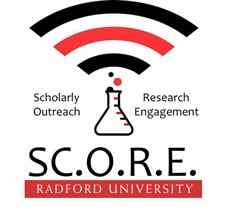RU SC.O.R.E. premieres programming featuring student research activity

An obligatory task at the beginning of a new school year used to be a theme titled "How I spent my summer vacation."
A Radford University initiative, RU SC.O.R.E. (Scholarly Research. Outreach. Education.), will allow students who conducted research to explore that theme in a new way.
The SC.O.R.E. program has published online a series of multi-media projects to show, not tell, the stories of this summer’s student research initiative.
A compilation of this artistic and scientific research is now featured at the SC.O.R.E. Facebook page. The individual products- video, weblogs and photography – can also be found YouTube, Vimeo, Tumblr and Flickr.
From Costa Rica, Southern California and Alaska, as well as the university jewelry studio or even a desktop, RU students have chronicled their Summer 2014 research activities in diverse disciplines and ways.
"The real goal is for these researchers to tell the public in their own words and in their own ways why their work is important," said Jason Davis, assistant professor of biology and program director. "Scholars have to resist the urge to turn inward and must instead face outward, otherwise their disciplines will wither and die."
Fourteen student projects to communicate the research and its translational value are in production. As many as 10 more are on the drawing boards for the pilot program, supported by the Office of High-Impact Practices and the Office of Undergraduate Research and Scholarship. A one-credit class about communicating the value and excitement of original research on multiple media platforms will start this fall and feature sessions with media professionals and facilitate the development of individual projects.
The program is open to any RU student researcher who wants to sharpen his or her skill sets in presenting and packaging their original research for popular consumption, said Davis. The program assists the researchers with the mechanics of planning, producing and distributing their self-generated media and provides guidance and feedback throughout the production process.
"To initiate research projects, students must be passionate and knowledgeable and we try to capture that passion and help them with narrative, story and voice as well the technical elements," said Davis. "We want to help them convey the excitement and value of their work without getting lost in scientific or technical language or patronizing the audience."